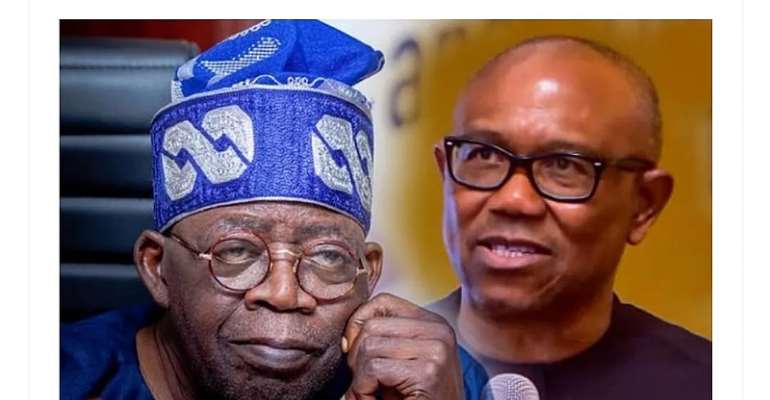Obi V. Tinubu: Dissecting The Craters In Pepc Verdict.

In the build up to the 2015 general elections, INEC, pursuant to the duties imposed on it by the extant Electoral Act, had introduced the card reader machine as the medium of accreditation for the 2015 general elections. INEC's directorate of voter education went round the country and campaigned on every available media platform for voters and candidates to insist on card reader accreditation on the election day. They stated in the guidelines that where the total number of votes cast varied from the number of card reader accreditation, such election would be invalid. On the election day, some politicians connived with INEC officials, abandoned the card reader machines and embarked on massive rigging characterized by multiple voting, falsification of results and "manual" accreditation. At the tribunal, I was shocked to the marrows when I watched INEC legal team argue that non-compliance with their election guidelines did not amount to irregularity because their guidelines did not conform with the Electoral Act! In other words, INEC was telling Nigerians never to trust it!
When the 2022 Electoral Act was enacted, while many Nigerians celebrated the landmark abolition of manual accreditation, I faulted the provisions of the act which gave INEC the discretion to determine the mode of transmission of election results. For emphasis, the 2022 Electoral Act in section 60 (5) provided that: "The presiding officer shall transfer the result including the total number of accredited voters and the result of the ballot in a manner as prescribed by the Commission." Even though the pre-election scenario that preceded the 2023 general elections was markedly different from those of previous general elections in Nigeria, I could not trust what INEC would do with discretionary powers or how mercantile judges would interpret the clause that conferred such discretionary powers on INEC.
The conduct of the Nigerian electoral umpire, INEC, ahead of the election proved that pursuant to the provisions of section 60(5) of the 2022 Electoral Act, INEC had actually "prescribed" the manner in which the 2023 election results should be transmitted and actually schooled Nigerian voters, election officials and the rest of the world on the prescribed manner of transmission. The INEC- prescribed manner of transmission of the 2023 general elections results was realtime electronic transmission from polling units using Bimodal Voter Accreditation System, BVAS, machines! Having decided on this manner of transmission of election results, INEC went to town with it preaching it to the citizenry and other critical stakeholders in the 2023 general elections through direct interfaces and on all mass media platforms. To crown it all, INEC enacted this "prescribed manner" in the 2023 general elections guidelines and manuals.
The submission of the PEPC that INEC was at liberty to determine the method of transmission of election results is correct to the extent that INEC exhausted that liberty or discretion the moment it adopted, announced and wrote in its guidelines and manuals real-time electronic transmission of election results through BVAS; and went on to state that results not so transmitted was invalid. In fact, the INEC prescription for realtime electronic transmission of the 2023 general elections results was an integral part of the 2022 Electoral Act because without it, the Act was incomplete. So, it is wrong for the Presidential Election Petition Court, PEPC, to allow INEC to repudiate actions or decisions it took pursuant to the rights conferred on it by the Electoral Act. A semantic approach to the word, "prescribed" in section 60(5) of the 2022 Electoral Act shows that to prescribe means, "To specify by writing as a required procedure or ritual; to lay down authoritatively as a guide, direction, or rule of action." INEC's writings in the 2023 general elections guidelines and manuals; instructions to election officials; and averments to Nigerians during her very intensive voter education campaigns ahead of the 2023 general elections showed that it had "prescribed" realtime electronic transmission of poll results through BVAS machines and from the polling units for the 2023 general elections. Having prescribed thus, there is nothing in the Nigerian constitution or in the 2022 Electoral Act to permit INEC's repudiation of its prescribed manner of transmission of election results during or after the election. It is doubtful that the PEPC justices considered the integrity of the electoral umpire when they gave their curious verdict. On the requirement of "not less than one-quarter of the votes cast at the election in each of at least two-thirds of all the States in the Federation and the Federal Capital Territory, Abuja", it was obvious that the PEPC justices went out of their way to actually amend section 134 (2) (b) of the 1999 CFRN instead of interpreting it! "And" is a coordinate conjunction and was used as such in the aforementioned section of the constitution. The judiciary has no power to amend the constitution. It is hoped that the Supreme Court will reverse PEPC on these issues and especially bind INEC to its prescriptions for election results transmission so that Nigerian voters will have reasons to trust INEC again. The judiciary and INEC should stop making military dictatorship more appealing to Nigerians than democracy.
